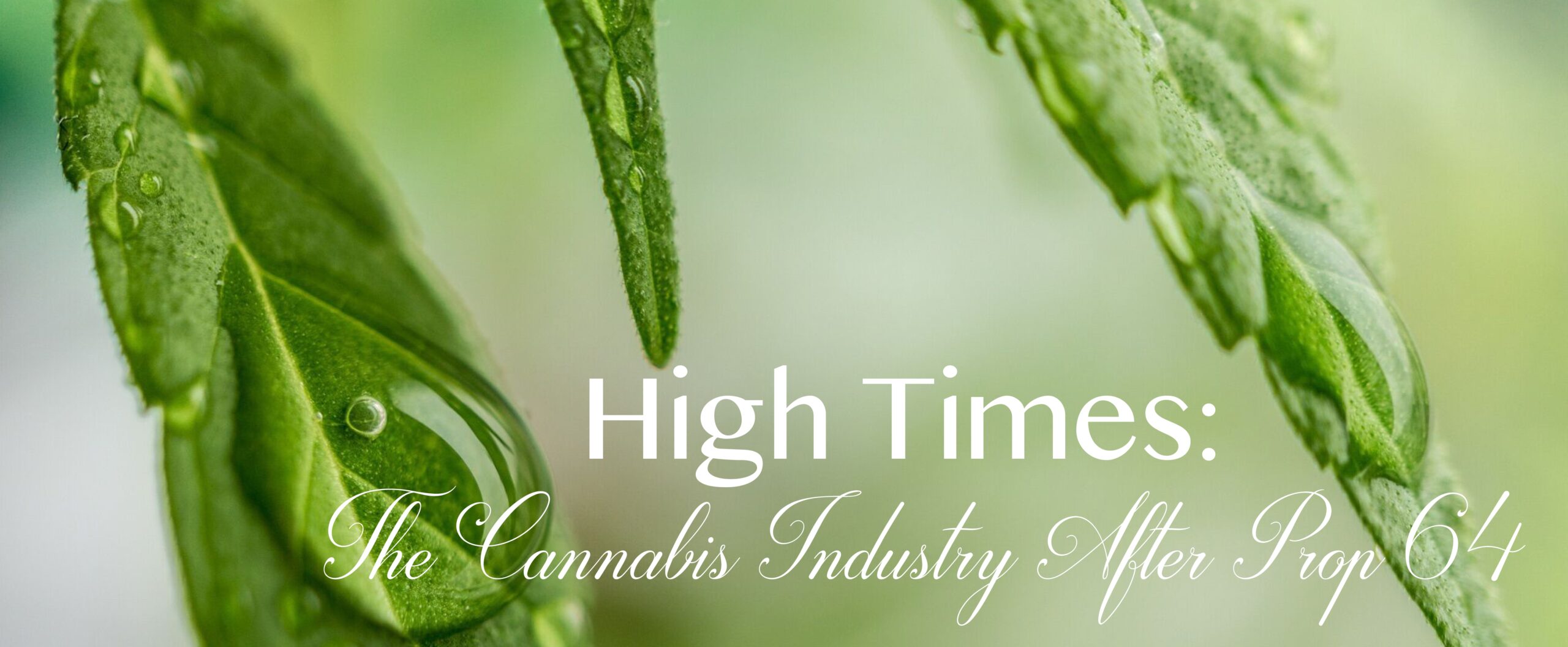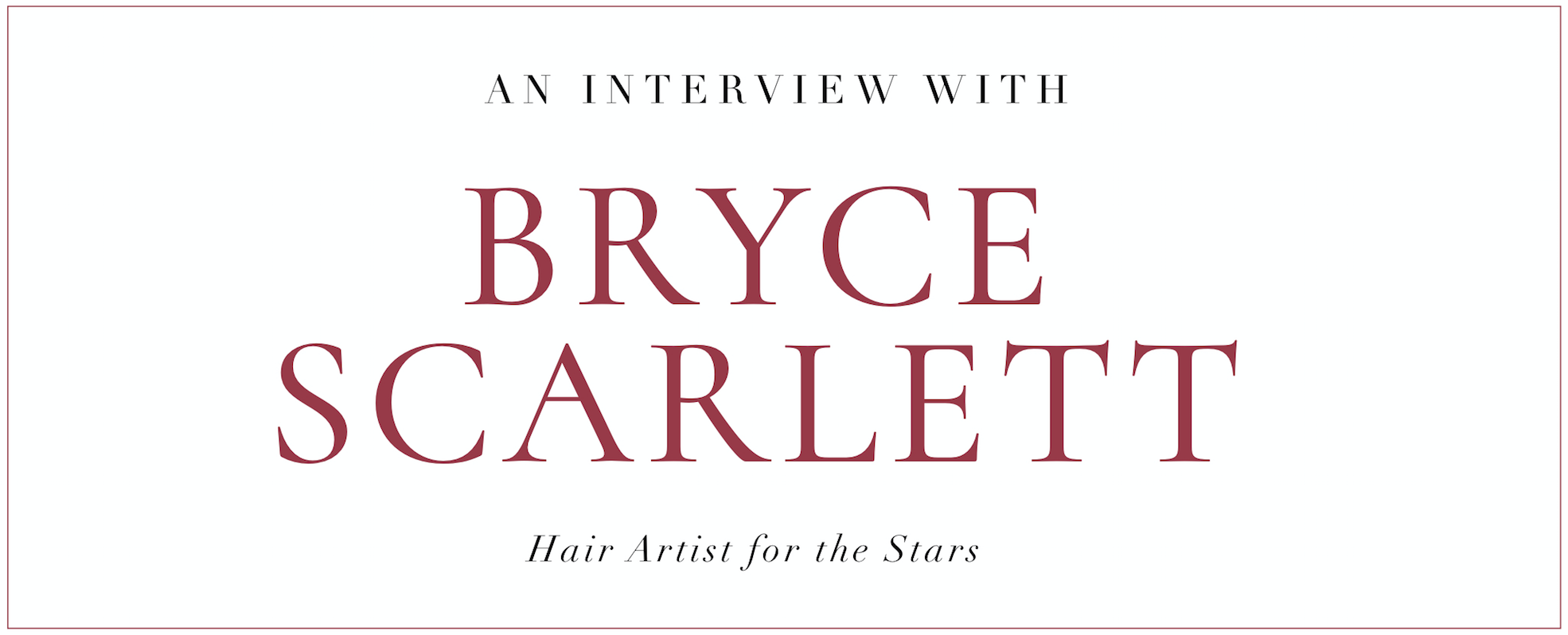High Times: The Cannabis Industry After Prop 64
Writer Jenny Heyside @theblondera
On November 8th, voters in California approved Proposition 64, making California the most populous state in the nation to legalize the recreational use of marijuana. It didn’t come as too much of a surprise, given that California led the way 20 years ago by legalizing medical marijuana in the state. Proposition 64 allows Californians who are 21 and older to possess, transport, buy and use up to an ounce of cannabis for recreational purposes and allows individuals to grow as many as six plants. The measure also allows for retail sales of marijuana and imposes a 15% tax. Two days after the Proposition was passed, I sat down again with Ben Browning. Ben is a budding entrepreneur and creator and founder of “Smoke Benjis” — a grass-roots marijuana collective that specializes in creating hand- tailored cigars filled with up to 10 grams of Browning’s own strain of marijuana. Ben and I originally met on a Monday afternoon in August to discuss the legality of his marijuana products. This time we met in the Sherman Oaks office of Luke Stanton and Jeffrey Welsh, partners at Frontera Law Group — a boutique law firm specializing in the legal cannabis industry. I was curious to hear what exactly the team does, as well as everyone’s views on the after-effects of the vote.
JH: Give us a bit of background on how you came to start this law practice.
LS: I have been working in this arena since 2010. I started off working for a criminal defense attorney, who runs one of the better  criminal defense marijuana focused practices in the state. Back in 2010, prior to Colorado and Washington legalizing recreational use, it was still a medical program that was on very shaky ground, in terms of whether businesses were legitimate, what the rules around them were. Since we passed the 1996 Compassionate Use Act in California, the law has existed as an affirmative defense. Think of it like self-defense in a murder case. Until we implement both the medical and the recreational programs in 2018, medical marijuana law still exists in this manner. So, at a technical, legal level, being a criminal defense attorney was the best way that you could help the industry because you were keeping the guys out of jail by going in and asserting this defense over and over and over. That’s how I got started.
criminal defense marijuana focused practices in the state. Back in 2010, prior to Colorado and Washington legalizing recreational use, it was still a medical program that was on very shaky ground, in terms of whether businesses were legitimate, what the rules around them were. Since we passed the 1996 Compassionate Use Act in California, the law has existed as an affirmative defense. Think of it like self-defense in a murder case. Until we implement both the medical and the recreational programs in 2018, medical marijuana law still exists in this manner. So, at a technical, legal level, being a criminal defense attorney was the best way that you could help the industry because you were keeping the guys out of jail by going in and asserting this defense over and over and over. That’s how I got started.
In 2012, when Colorado and Washington decided to legalize recreationally, the whole country (to some extent) but especially the industry in California began to look at things a little differently. Staring in 2013, I became the de-facto business department for my criminal law firm. At the beginning of 2015, I started my own business-focused law firm. In the two years we have gathered up a huge amount of clients from all aspects of the cannabis-industry, including business owners, commercial real estate companies, tech guys and private equity firms. As well as people developing cannabis brands, like Ben. Most people think we solely represent growers, and we do have a couple of those guys, but we have more and more clients who are bringing nine- figure capital into the industry.
JH: Is the expectation that the marijuana market will develop similarly to the alcohol market?
LS: Yeah, I think a lot of people think that. There are a lot of different ways of looking at it, some people look at it as an agricultural commodity, like tobacco or cotton or corn.
JW: Broccoli.
LS: (Laughs) Some people look at it more like alcohol, others regard it as being more similar to pharmaceutical industries. JW: I think it depends completely on what side of the market you are looking at. If you are taking a very medical approach, then taking a pharmaceutical angle makes a lot of sense. But if you are taking more of a recreational approach, then it will be a different development — nobody wants to get high by taking a pill
LS: One of the things that I think is cool about this industry is that we currently have the chance to innovate in terms of general business practices, management styles, ways that companies are put together and run, and how profits and fees are split. That being said, one of the main challenges of being a lawyer in this space is that we are dealing with a lot of issues for the first time. In other more developed markets with more mature legislation and regulations, there are case laws and precedents for you to follow. In the cannabis space it is mainly the first time that these things are being litigated. But it is fun to be in an industry where you have more wiggle room, it is all still fuzzy and hazy.
BB: It is 420 shades of grey.
JW: Another way that our industry can set new precedents is by doing right by women and minorities in leadership positions. {JH: In corporate America, women hold about a quarter of leadership roles and less than 5% of CEO positions. But in the cannabis industry, women make up about 36% of leaders, including 63% of high-level positions at testing labs and half of leadership roles at infused products and processing companies.}
 JH: Ben, you previously also mentioned that you love being able to innovate. Do you think, and if so how, this proposition is going to change that ability?
JH: Ben, you previously also mentioned that you love being able to innovate. Do you think, and if so how, this proposition is going to change that ability?
BB: Well I know for sure that big businesses are going to come in. But from what I know, they are going to be restricting the huge-growers for five years. It was a compromise that was given to the industry, to give small-growers some time to expand and develop their business, before we get bombarded with “Costco weed”. But, I think there is still room for people who can make and develop a solid brand.
JH: So what happens now? Can anyone 21+ just walk into a dispensary and buy a joint?
LS: Well, it is not one of these laws where you just flip the switch and everything is done. They have passed the legislation, now they have another year to write all the rules and regulations relative to the legislation. Then they will release applications for people who want to be licensed, then they will be have to evaluate those applications, reward those licenses, and then eventually we will have shops that operate in a regulated marketplace where people can just come in.
All the different counties and cities are now also grappling with how to regulate it. There are a whole range of ways that it is currently being dealt with in individual city codes, which deals with where, when, how these businesses might exist. A lot of them don’t address it, other just ban it, so people are used to going into those areas and operating illegally. Now everyone is trying to figure out how to be in line locally, so that they can be established when the state is ready to license in 2018. It’s a crazy patchwork of all these different people thinking divergent ways.
JH: What about in terms of edibles (chocolate bars, cookies, brownies, candies)?
JW: On the recreational side, edible products will only be able to have a maximum of 10mg per dose. This is a positive thing because one of the current issues is that on the medical side you can get 1000mg cookies or brownies or chocolate bars or whatever. These are the products that have been ingested when you hear horror stories about people freaking out. That isn’t going to happen in a regulated marketplace with mandated lower dosages. There are people out there who are very upset about this — but it is going to make things a lot safer. As the science side improves, that also will help to improve the safety of edibles.
JH: Ben, how did you feel on Wednesday morning when you heard the news?
BB: Obviously I was excited because it legitimizes what I am doing. A lot of growers that I know were saying “this is so bad for us”, but that’s because they want to stay in that black market space and have no regulation. Personally, I want to build my business so that it is sellable. You can’t sell a black market business! These guys (Luke and Jeffrey) keep me in the straight and narrow, as opposed to me just being a cowboy and trying to cash in.
JH: Where did the idea for Smoke Benjis come from
BB: When I returned from living in Bali I was working at a bar and I saw they were rolling cigars and I started wondering why no-one was doing that with cannabis. I had a medical marijuana card and my own marijuana collective, so I decided that I could do it.
My grandfather [who is tattooed on his right arm] was the world’s largest watermelon farmer and I used to work for him every summer. Because of those experiences I know a lot about agriculture and have always had a green thumb.
JH: How can people currently buy your products?
BB: Well, right now they would have to join my collective. Having a collective means that I can take patients who have a doctor’s recommendation from the state of California and a valid California ID. I am able to grow marijuana plants for anyone who is in my collective. It is free to join and then patients pay for whatever they are using. Recreationally I want the 1.5 gram cigars to go for $20, which is pretty competitive for my own strain.
JH: In addition to Frontera Law Group, you also have Frontera Entertainment, what is going on over there?
JW: Our focus on the entertainment side is to change the national conversation surrounding marijuana by creating content that is simultaneously educational and entertaining. Typically, when you think about any kind of cannabis content, you think of the very stereotypical stoner comedy. Those can be great, but they don’t change the conversation. We have identified a couple of younger entrepreneurs that we feel have really nice media upside and have helped usher them along. One of our clients, Chris Sayegh (theherbalchef. com), was the second person in this space to be signed by a major talent agency. He is 24-years old and wants to be the first celebrity, cannabis chef.
The other side is to get some more of our well capitalized clients national exposure through more traditional entertainment activations. We were able to get a company called Weedmaps on HBO back in February, that was the first time any cannabis company had ever received national exposure.
We also want to involve artists and personalities that you might not traditionally associate with cannabis-use, in an effort to change the conversation rather than reinforce the existing stereotypes. With Prop 64 passing, the entertainment industry here in LA is really excited about moving forward with all of this and waving in a new era of cannabis content.
BB: Everything starts in California and then sweeps across the nation.













Leave a Reply